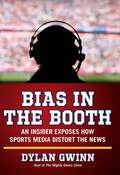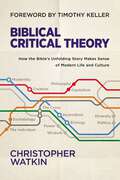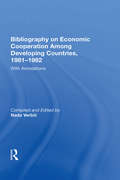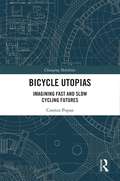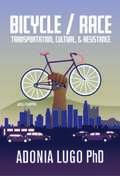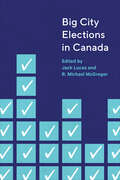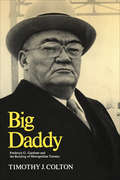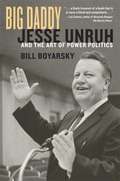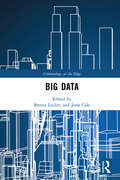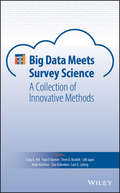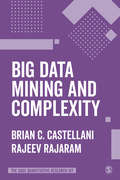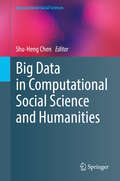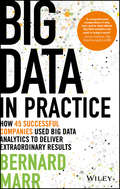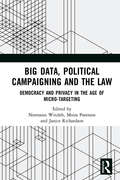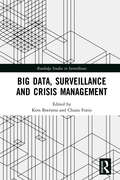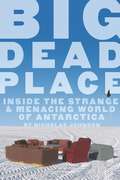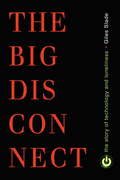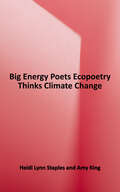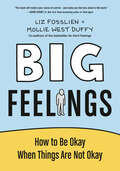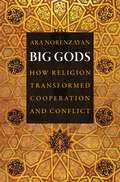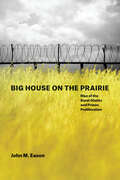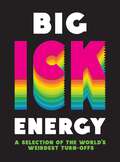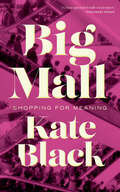- Table View
- List View
Bias in the Booth: An Insider Exposes How the Sports Media Distort the News
by Dylan GwinnMost of us see sports as a welcome--even blessed--relief from the challenges and frustrations of everyday life. We want to sit back, open a beer, and enjoy the game. But many of those who bring us the game have a different agenda--they use their broadcasting platform to harangue us with their own politically correct preoccupations. If a seventh-round NFL draft pick who can't make the team or an over-the-hill basketball player declares that he's gay, he gets wall-to-wall media coverage and is hailed as a hero. If a stripper accuses college lacrosse players of rape, liberal sports reporters lead the lynch mob--with no apologies when the bearers of "white privilege" are proved innocent. In his blistering new book Bias in the Booth, sports reporter and commentator Dylan Gwinn takes you inside the sports media spin machine to reveal what they hope you won't notice: the sports media are no different from the news and entertainment media.
Biblical Critical Theory: How the Bible's Unfolding Story Makes Sense of Modern Life and Culture
by Christopher WatkinA bold vision for Christians who want to engage the world in a way that is biblically faithful and culturally sensitive.In Biblical Critical Theory, Christopher Watkin shows how the Bible and its unfolding story help us make sense of modern life and culture.Critical theories exist to critique what we think we know about reality and the social, political, and cultural structures in which we live. In doing so, they make visible the values and beliefs of a culture in order to scrutinize and change them.Biblical Critical Theory exposes and evaluates the often-hidden assumptions and concepts that shape late-modern society, examining them through the lens of the biblical story running from Genesis to Revelation, and asking urgent questions like:How does the Bible's storyline help us understand our society, our culture, and ourselves?How do specific doctrines help us engage thoughtfully in the philosophical, political, and social questions of our day?How can we analyze and critique culture and its alternative critical theories through Scripture? Informed by the biblical-theological structure of Saint Augustine's magisterial work The City of God (and with extensive diagrams and practical tools), Biblical Critical Theory shows how the patterns of the Bible's storyline can provide incisive, fresh, and nuanced ways of intervening in today's debates on everything from science, the arts, and politics to dignity, multiculturalism, and equality. You'll learn the moves to make and the tools to use in analyzing and engaging with all sorts of cultural artifacts and events in a way that is both biblically faithful and culturally relevant.It is not enough for Christians to explain the Bible to the culture or cultures in which we live. We must also explain the culture in which we live within the framework and categories of the Bible, revealing how the whole of the Bible sheds light on the whole of life.If Christians want to speak with a fresh, engaging, and dynamic voice in the marketplace of ideas today, we need to mine the unique treasures of the distinctive biblical storyline.
Bibliography On Economic Cooperation Among Developing Countries, 1981-1982: With Annotations
by Nada VerbicCovering the period 1981-1982 and containing more than 2, 000 entries of books, articles (from 283 periodicals in nine different languages), studies, reports, and official documents, this international bibliography on economic cooperation and regional integration among developing countries includes annotations for many entries, an alphabetical list
Bicycle Utopias: Imagining Fast and Slow Cycling Futures (Changing Mobilities)
by Cosmin PopanBicycle Utopias investigates the future of urban mobilities and post-car societies, arguing that the bicycle can become the nexus around which most human movement will revolve. Drawing on literature on post-car futures (Urry 2007; Dennis and Urry 2009), transition theory (Geels et al. 2012) and utopian studies (Levitas 2010, 2013), this book imagines a slow bicycle system as a necessary means to achieving more sustainable mobility futures. The imagination of a slow bicycle system is done in three ways: Scenario building to anticipate how cycling mobilities will look in the year 2050. A critique of the system of automobility and of fast cycling futures. An investigation of the cycling senses and sociabilities to describe the type of societies that such a slow bicycle system will enable. Bicycle Utopias will appeal to students and scholars in fields such as sociology, mobilities studies, human geography and urban and transport studies. This work may also be of interest to advocates, activists and professionals in the domains of cycling and sustainable mobilities.
Bicycle/Race: Transportation, Culture, & Resistance
by Adonia E. LugoBicycle/Race paints an unforgettable picture of Los Angeles—and the United States—from the perspective of two wheels. This is a book of borderlands and intersections, a cautionary tale about the dangers of putting infrastructure before culture, and a coming-of-age story about power and identity. The colonial history of southern California is interwoven through Adonia Lugo's story of growing up Chicana in Orange County, becoming a bicycle anthropologist, and co-founding Los Angeles's hallmark open streets cycling event, CicLAvia, along the way. When she takes on racism in the world of national bicycle advocacy in Washington, DC, she finds her voice and heads back to LA to organize the movement for environmental justice in active transportation.In the tradition of City of Quartz, this book will forever change the way you see Los Angeles, race and class in the United States, and the streets and people around you wherever you live.
Big City Elections in Canada
Local elections are an increasingly popular area of research among scholars of Canadian political behaviour, offering invaluable insights into the attitudes and motivations of Canadian electors. The Canadian Municipal Election Study (CMES) has collected unparalleled individual-level survey data in eight major Canadian municipal elections: Vancouver, Calgary, Winnipeg, London, Mississauga, Toronto, Montreal, and Quebec City. These elections, which took place in 2017 and 2018, were high-profile, contentious, and often surprising, featuring mayoral defeats, record-breaking turnouts, provincial-municipal tensions, and the first ranked-ballot election in Canada in decades. Combining unprecedented individual-level survey data from the CMES with local expertise from political scientists across Canada, Big City Elections in Canada provides a data-driven overview of each election, while also highlighting the more general lessons the elections teach us about municipal politics and voting behaviour. The chapters in this book make substantial empirical and theoretical contributions to the voting behaviour and urban political science subfields and will appeal to students, journalists, and engaged citizens who are interested in learning more about municipal elections in their cities.
Big Crime and Big Policing: All about Big Money?
by Stephen Schneider Tonita Murray Elizabeth KirleyFollowing money over national borders, banking systems, casinos, and free trade zones, as well as the world of the corrupt elites, Big Crime and Big Policing brings new scholarly and practical insights into our understanding of the interplay of money, crime, and policing on the grand scale. In this wide-ranging volume, a mixed group of scholars and practitioners aim to show how money dictates the scope and nature of financial and corporate crimes, and the impact of these crimes on national economies, social institutions, and communal well-being alike. The book examines how the combined efforts of governments and international organizations fail to stop financial crime at its source and, despite apparently generous human and financial resources, police and law enforcement efforts ultimately fall short of defeating big crime and of meeting public safety needs. International in scope, Big Crime and Big Policing provides fresh reflection on a significant problem of our age, one that demands greater attention from governments and the public.
Big Daddy: Frederick G. Gardiner and the Building of Metropolitan Toronto
by Timothy ColtonFrederick Gardiner's public life was rich and long, from his initiation into politics as a Toronto schoolboy before the First World War, through his involvement with the Ontario Conservative party and suburban politics in the 1930s and 1940s, on through his years as first chairman of Metropolitan Toronto (1953-61), to the relinquishing of his last public office in 1979. This is a readable and perceptive biography of the exuberant and powerful politician who captured the public imagination of Toronto and created a legend around himself during his lifetime. The book focuses mainly on Gardiner's experience as founding boss of Metropolitan Toronto. This first metropolitan government in North America was in many ways his personal machine. Gardiner made an indispensable contribution to its effectiveness and to its very survival. He presided over an unprecedented boom in urban development and construction. His public works projects included the first urban expressway in Canada (the Gardiner Expressway). Gardiner's political nickname, 'Big Daddy,' fits him well. He revelled in his reputation as a political bulldozer, and was often described as the Canadian equivalent of Robert Moses, the famous and feared coordinator of construction for New York City. Gardiner was a man for the times, an unusual person whose character seemed to match the requirements of a city bursting at its seams. His lack of interest in public participation generated great controversy and left a lasting impression on Toronto's metropolitan government. Readers concerned with politics and urban government will learn much from Gardiner's experiences and conduct as he wrestled with his political surroundings and with urban policy problems such as planning, housing, and transportation. And this portrait of a dynamic and aggressive man who symbolized the Toronto on a generation ago will appeal to those who remember these years. Electronic Format Disclaimer: Photo section removed after page 150 at the request of the rights holder.
Big Daddy: Jesse Unruh and the Art of Power Politics
by Bill BoyarskyRevealing and frank, this highly engaging biography tells the story of an American original, California's Big Daddy, Jesse Unruh (1922-1987), a charismatic man whose power reached far beyond the offices he held. Unruh, who was born into Texas sharecropper poverty, became a larger-than-life figure and a principal architect and builder of modern California--first as an assemblyman, then as assembly speaker, and finally, as state treasurer. He was also a great character: a combination of intelligence, wit, idealism, cynicism, woman-chasing vulgarity, charm, drunken excess, and political skill all wrapped up in one big package. He dominated the California capitol and extended his influence to Washington and Wall Street. He was close to Lyndon Johnson and the Kennedys, but closest to Robert Kennedy, and was in the Ambassador Hotel kitchen when Kennedy was shot. Bill Boyarsky gives a close-up look at this extraordinary political leader, a man who believed that politics was the art of the possible, and his era.
Big Data (Criminology at the Edge)
by Benoit Leclerc Jesse CaleThe internet has launched the world into an era into which enormous amounts of data are generated every day through technologies with both positive and negative consequences. This often refers to big data . This book explores big data in organisations operating in the criminology and criminal justice fields. Big data entails a major disruption in the ways we think about and do things, which certainly applies to most organisations including those operating in the criminology and criminal justice fields. Big data is currently disrupting processes in most organisations – how different organisations collaborate with one another, how organisations develop products or services, how organisations can identify, recruit, and evaluate talent, how organisations can make better decisions based on empirical evidence rather than intuition, and how organisations can quickly implement any transformation plan, to name a few. All these processes are important to tap into, but two underlying processes are critical to establish a foundation that will permit organisations to flourish and thrive in the era of big data – creating a culture more receptive to big data and implementing a systematic data analytics-driven process within the organisation. Written in a clear and direct style, this book will appeal to students and scholars in criminology, criminal justice, sociology, and cultural studies but also to government agencies, corporate and non-corporate organisations, or virtually any other institution impacted by big data.
Big Data Meets Survey Science: A Collection of Innovative Methods (Wiley Series in Survey Methodology)
by Craig A HillOffers a clear view of the utility and place for survey data within the broader Big Data ecosystem This book presents a collection of snapshots from two sides of the Big Data perspective. It assembles an array of tangible tools, methods, and approaches that illustrate how Big Data sources and methods are being used in the survey and social sciences to improve official statistics and estimates for human populations. It also provides examples of how survey data are being used to evaluate and improve the quality of insights derived from Big Data. Big Data Meets Survey Science: A Collection of Innovative Methods shows how survey data and Big Data are used together for the benefit of one or more sources of data, with numerous chapters providing consistent illustrations and examples of survey data enriching the evaluation of Big Data sources. Examples of how machine learning, data mining, and other data science techniques are inserted into virtually every stage of the survey lifecycle are presented. Topics covered include: Total Error Frameworks for Found Data; Performance and Sensitivities of Home Detection on Mobile Phone Data; Assessing Community Wellbeing Using Google Street View and Satellite Imagery; Using Surveys to Build and Assess RBS Religious Flag; and more. Presents groundbreaking survey methods being utilized today in the field of Big Data Explores how machine learning methods can be applied to the design, collection, and analysis of social science data Filled with examples and illustrations that show how survey data benefits Big Data evaluation Covers methods and applications used in combining Big Data with survey statistics Examines regulations as well as ethical and privacy issues Big Data Meets Survey Science: A Collection of Innovative Methods is an excellent book for both the survey and social science communities as they learn to capitalize on this new revolution. It will also appeal to the broader data and computer science communities looking for new areas of application for emerging methods and data sources.
Big Data Mining and Complexity (The SAGE Quantitative Research Kit)
by Rajeev Rajaram Brian C. CastellaniThis book offers a much needed critical introduction to data mining and ‘big data’. Supported by multiple case studies and examples, the authors provide: Digestible overviews of key terms and concepts relevant to using social media data in quantitative research. A critical review of data mining and ‘big data’ from a complexity science perspective, including its future potential and limitations A practical exploration of the challenges of putting together and managing a ‘big data’ database An evaluation of the core mathematical and conceptual frameworks, grounded in a case-based computational modeling perspective, which form the foundations of all data mining techniques Part of The SAGE Quantitative Research Kit, this book will give you the know-how and confidence needed to succeed on your quantitative research journey.
Big Data Mining and Complexity (The SAGE Quantitative Research Kit)
by Rajeev Rajaram Brian C. CastellaniThis book offers a much needed critical introduction to data mining and ‘big data’. Supported by multiple case studies and examples, the authors provide: Digestible overviews of key terms and concepts relevant to using social media data in quantitative research. A critical review of data mining and ‘big data’ from a complexity science perspective, including its future potential and limitations A practical exploration of the challenges of putting together and managing a ‘big data’ database An evaluation of the core mathematical and conceptual frameworks, grounded in a case-based computational modeling perspective, which form the foundations of all data mining techniques Part of The SAGE Quantitative Research Kit, this book will give you the know-how and confidence needed to succeed on your quantitative research journey.
Big Data in Computational Social Science and Humanities (Computational Social Sciences)
by Shu-Heng ChenThis edited volume focuses on big data implications for computational social science and humanities from management to usage. The first part of the book covers geographic data, text corpus data, and social media data, and exemplifies their concrete applications in a wide range of fields including anthropology, economics, finance, geography, history, linguistics, political science, psychology, public health, and mass communications. The second part of the book provides a panoramic view of the development of big data in the fields of computational social sciences and humanities. The following questions are addressed: why is there a need for novel data governance for this new type of data?, why is big data important for social scientists?, and how will it revolutionize the way social scientists conduct research? With the advent of the information age and technologies such as Web 2.0, ubiquitous computing, wearable devices, and the Internet of Things, digital society has fundamentally changed what we now know as "data", the very use of this data, and what we now call "knowledge". Big data has become the standard in social sciences, and has made these sciences more computational. Big Data in Computational Social Science and Humanities will appeal to graduate students and researchers working in the many subfields of the social sciences and humanities.
Big Data in Practice: How 45 Successful Companies Used Big Data Analytics to Deliver Extraordinary Results
by Bernard MarrThe best-selling author of Big Data is back, this time with a unique and in-depth insight into how specific companies use big data. Big data is on the tip of everyone's tongue. Everyone understands its power and importance, but many fail to grasp the actionable steps and resources required to utilise it effectively. This book fills the knowledge gap by showing how major companies are using big data every day, from an up-close, on-the-ground perspective. From technology, media and retail, to sport teams, government agencies and financial institutions, learn the actual strategies and processes being used to learn about customers, improve manufacturing, spur innovation, improve safety and so much more. Organised for easy dip-in navigation, each chapter follows the same structure to give you the information you need quickly. For each company profiled, learn what data was used, what problem it solved and the processes put it place to make it practical, as well as the technical details, challenges and lessons learned from each unique scenario. Learn how predictive analytics helps Amazon, Target, John Deere and Apple understand their customers Discover how big data is behind the success of Walmart, LinkedIn, Microsoft and more Learn how big data is changing medicine, law enforcement, hospitality, fashion, science and banking Develop your own big data strategy by accessing additional reading materials at the end of each chapter
Big Data, Political Campaigning and the Law: Democracy and Privacy in the Age of Micro-Targeting
by Normann Witzleb Moira Paterson Janice RichardsonIn this multidisciplinary book, experts from around the globe examine how data-driven political campaigning works, what challenges it poses for personal privacy and democracy, and how emerging practices should be regulated. The rise of big data analytics in the political process has triggered official investigations in many countries around the world, and become the subject of broad and intense debate. Political parties increasingly rely on data analytics to profile the electorate and to target specific voter groups with individualised messages based on their demographic attributes. Political micro-targeting has become a major factor in modern campaigning, because of its potential to influence opinions, to mobilise supporters and to get out votes. The book explores the legal, philosophical and political dimensions of big data analytics in the electoral process. It demonstrates that the unregulated use of big personal data for political purposes not only infringes voters’ privacy rights, but also has the potential to jeopardise the future of the democratic process, and proposes reforms to address the key regulatory and ethical questions arising from the mining, use and storage of massive amounts of voter data. Providing an interdisciplinary assessment of the use and regulation of big data in the political process, this book will appeal to scholars from law, political science, political philosophy and media studies, policy makers and anyone who cares about democracy in the age of data-driven political campaigning.
Big Data, Surveillance and Crisis Management (Routledge Studies in Surveillance)
by Kees Boersma and Chiara FonioBig data, surveillance, crisis management. Three largely different and richly researched fields, however, the interplay amongst these three domains is rarely addressed. Through unique international case studies this book examines the links between these three fields. Considering crisis management as an 'umbrella term' that covers a number of crises and ways of managing them, this book explores the collection of ‘big data’ by governmental crisis organisations, as well as the unintended consequences of using such data. In particular, through the lens of surveillance, the contributions investigate how the use and abuse of big data can easily lead to monitoring and controlling the behaviour of people affected by crises. Readers will understand that big data in crisis management must be examined as a political process, involving questions of power and transparency. A highly topical volume, Big Data, Surveillance and Crisis Management will appeal to postgraduate students and postdoctoral researchers interested in fields including Sociology and Surveillance Studies, Disaster and Crisis Management, Media Studies, Governmentality, Organisation Theory and Information Society Studies.
Big Dead Place
by Nicholas JohnsonJohnson's savagely funny [book] is a grunt's-eye view of fear and loathing, arrogance and insanity in a dysfunctional, dystopian closed community. It's like M*A*S*H on ice, a bleak, black comedy."--The Times of London
Big Disconnect
by Giles SladeSmart phones and social media sites may be contemporary fixations, but using technology to replace face-to-face interactions is not a new cultural phenomenon. Throughout our history, intimacy with machines has often supplanted mutual human connection. This book reveals how consumer technologies changed from analgesic devices that soothed the loneliness of a newly urban generation to prosthetic interfaces that act as substitutes for companionship in modern America. The history of this transformation helps explain why we use technology to mediate our connections with other human beings instead of seeking out face-to-face contact. Do electronic interfaces receive most of our attention to the detriment of real interpersonal communication? Why do sixty million Americans report that isolation and loneliness are major sources of unhappiness? The author provides many insights into our increasingly artificial relationships and a vision for how we can rediscover genuine community and human empathy.
Big Energy Poets: Ecopoetry Thinks Climate Change
by Amy King Heidi Lynn StaplesThis is more than another book on climate change, these disparate authors are collectively voices in the same struggle: How to ensure the planet's survival, where planet and body (human or otherwise) are not separate but synonymous, are inextricably tied. There is a necessary insistence in this anthology on the body politic being the earth's politic. Together, this is a creative treatise toward the integrity of continuance, and against fear of the other, the 'other' being as much 'nature' as person. The introduction asks, 'Why poetry?' to confront the urgency of climate change and all of its implications and causalities. The answer is found in the challenge taken up by these poets as they allow us access to both their poetry and their process. Here authors utilize their critical and creative practices to forward a conversation we can simply not afford to ignore. Race, gender, genocide, these poets are asking questions and further, daring to question themselves. It may surprise some how many of the poets feel the poem as inhabiting the body and it becomes easier through that understanding to see how the poet, the body of the poet, connects to the land, to the environments in which they find themselves. Indeed, several of these poets even as they put words to the page in all manner of formats and styles, literally put their bodies on the line that marks the difference between apathy and action by marching, picketing and refusing to stop creating or privileging the power of the imagination to alter our course. Read this, powerful, instructional, and inspiring, it does what we want poetry to do, move us. The writing of poetry can make one adept at discerning systems, correlations, and interconnections. Ecopoetry is the nexus of science, activism and poetics. From Anna Lena Phillips Bell's intimate litanies of trees that bring to mind the names of children in a class ledger, to Lucas de Lima's take on transmogrification, to Meta Sama's evocative conflations of 'hair,' 'river' and 'sand,' here we find the polemics of universal intersectionality, a necessary embracement, where we all have something at stake and at risk. As Brenda Hillman writes in her essay, A Brutal Encounter Recollected in Tranquility, writing may be your most necessary action but you can't be the only one."--Vievee Francis
Big Feelings: How to Be Okay When Things Are Not Okay
by Liz Fosslien Mollie West DuffyFrom the duo behind the bestselling book No Hard Feelings and the wildly popular @LizandMollie Instagram, an insightful and approachable illustrated guide to handling our most difficult emotions.We all experience unwieldy feelings. But between our emotion-phobic society and the debilitating uncertainty of modern times, we usually don't know how to talk about what we're going through, much less handle it. Over the past year, Liz Fosslien and Mollie West Duffy&’s online community has laughed and cried about productivity guilt, pandemic anxiety, and Zoom fatigue. Now, Big Feelings addresses anyone intimidated by oversized feelings they can't predict or control, offering the tools to understand what's really going on, find comfort, and face the future with a sense of newfound agency. Weaving surprising science with personal stories and original illustrations, each chapter examines one uncomfortable feeling—like envy, burnout, and anxiety—and lays out strategies for turning big emotions into manageable ones. You&’ll learn: • How to end the cycle of intrusive thoughts brought on by regret, and instead use this feeling as a compass for making decisions • How to identify what&’s behind your anger and communicate it productively, without putting people on the defensive • Why we might be suffering from perfectionism even if we feel far from perfect, and how to detach your self-worth from what you do Big Feelings helps us understand that difficult emotions are not abnormal, and that we can emerge from them with a deeper sense of meaning. We can&’t stop emotions from bubbling up, but we can learn how to make peace with them.
Big Gods: How Religion Transformed Cooperation and Conflict
by Ara NorenzayanA groundbreaking account of how religion made society possibleHow did human societies scale up from tight-knit groups of hunter-gatherers to the large, anonymous, cooperative societies of today—even though anonymity is the enemy of cooperation? How did organized religions with "Big Gods"—the great monotheistic and polytheistic faiths—spread to colonize most minds in the world? In Big Gods, Ara Norenzayan makes the surprising argument that these fundamental puzzles about the origins of civilization answer each other.Sincere faith in watchful Big Gods unleashed unprecedented cooperation within ever-expanding groups, yet at the same time it introduced a new source of potential conflict between competing groups. And in some parts of the world, societies with atheist majorities—some of the most cooperative and prosperous in the world—have climbed religion's ladder, and then kicked it away.Big Gods answers fundamental questions about the origins and spread of world religions and helps us understand the rise of cooperative societies without belief in gods.
Big House on the Prairie: Rise of the Rural Ghetto and Prison Proliferation
by John M. EasonFor the past fifty years, America has been extraordinarily busy building prisons. Since 1970 we have tripled the total number of facilities, adding more than 1,200 new prisons to the landscape. This building boom has taken place across the country but is largely concentrated in rural southern towns. In 2007, John M. Eason moved his family to Forrest City, Arkansas, in search of answers to key questions about this trend: Why is America building so many prisons? Why now? And why in rural areas? Eason quickly learned that rural demand for prisons is complicated. Towns like Forrest City choose to build prisons not simply in hopes of landing jobs or economic wellbeing, but also to protect and improve their reputations. For some rural leaders, fostering a prison in their town is a means of achieving order in a rapidly changing world. Taking us into the decision-making meetings and tracking the impact of prisons on economic development, poverty, and race, Eason demonstrates how groups of elite whites and black leaders share power. Situating prisons within dynamic shifts that rural economies are undergoing and showing how racially diverse communities lobby for prison construction, Big House on the Prairie is a remarkable glimpse into the ways a prison economy takes shape and operates.
Big Ick Energy: A Selection of the World’s Weirdest Turn-Offs
by Summersdale PublishersAn "ick" is a turn-off - but not just any turn-off. With Big Ick Energy, forget being kind and courteous to your fellow human beings. This book revels in the immoral joy of passing ridiculous, unfounded critiques on the unsuspecting people around you and says: yes, you can judge - and you can feel good about it.
Big Mall
by Kate BlackA phenomenology of the mall: If the mall makes us feel bad, why do we keep going back? In a world poisoned by capitalism, is shopping what makes life worth living?Kate Black grew up in West Edmonton Mall – a mall on steroids, notorious for its indoor waterpark, deadly roller coaster, and controversial dolphin shows. But everyone has a favourite mall, or a mall that is their own personal memory palace. It's a place people love to hate and hate to love – a site of pleasure and pain, of death and violence, of (sub)urban legend. Blending a history of shopping with a story of coming of age in North America's largest and strangest mall, Big Mall investigates how these structures have become the ultimate symbol of late-capitalist dread – and, surprisingly, a subversive site of hope."Speaking as a child of PacSun and Hot Topic myself, Big Mall is like a madeleine dipped in Orange Julius. Like a mall, the book itself has a lot of everything, a sublime mix of memoir, history, and cultural criticism. Kate Black is a learned Virgil in the consumerist Inferno, always avoiding the obvious and leading us to surprising connections—oil, suicide, Reddit, squatters, dolphins. Whether malls fill you with nostalgia or horror, this book will change your relationship to the world we've constructed around us.” – Tony Tulathimutte, author of Private Citizens"Before there was Instagram, there was the mall. But what happens when a seasonless, tacky, fantasyland is all you knew growing up? How does one embrace a genuinely fake experience? Or to be more precise, a fake but genuine experience? Kate Black’s Big Mall is a smart, sentimental, and perspective-shifting look at the outsized role that big malls play in modern life. Love ‘em or hate ‘em, one thing’s for sure: after reading this book, you’ll never look at a mall in the same way again." – Ziya Tong, Science broadcaster & author of The Reality Bubble
